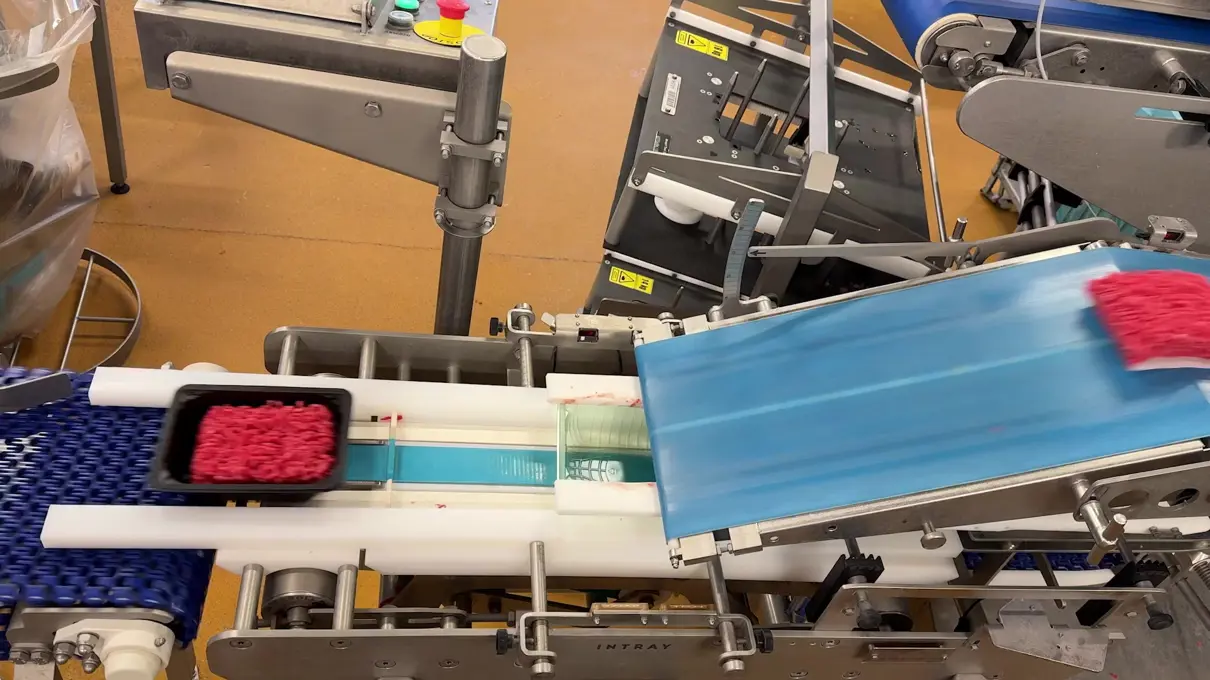Each year, Danish Crown sends 55 million black meat trays made of plastic into the Danish retail market, either as packaging for the Group’s own products or for private label products in Danish supermarkets. Danish consumers will now have to adjust to the fact that the classic black meat tray is changing.
- At Danish Crown, we have been actively working to address the challenges associated with the black plastic tray for a long time. As a modern food producer, we cannot accept that our packaging is not recycled on a large scale. In 2019, we transitioned to PET plastic, which should be recyclable. However, we must acknowledge that the current technology in sorting facilities presents challenges. As a consequence, we have decided to phase out our black trays, says Tim Ørting Jørgensen, member of the executive management at Danish Crown, with primary responsibility for the company's commercial division.
Inviting consumers to join the journey
The black meat trays pose a particular challenge when it comes to waste sorting, as they are often not recognised by the optical sorting systems (NIR) used to sort plastic waste. This is because black plastic does not reflect light in a way that allows the sensors to identify the material correctly. As a result, black meat trays often end up being incinerated instead of being recycled. The 55 million black meat trays from Danish Crown consist of a total of more than 1,000 tons of plastic.
The green colour of the new trays is carefully selected, not to signal the environmental benefits of the trays, but rather for practical reasons. Shifting from black to green makes the trays more easily detectable in the mechanical recycling processes, allowing used trays to be transformed into new ones. Opting for this solution allows for the utilisation of more recycled plastic from, for example, household waste, and not just bottles as before. This is explained by Faerch Group, a world leader in plastic recycling in the food industry. Faerch, which will produce the new trays for Danish Crown, guarantees that the trays will contain a minimum of 90 percent recycled plastic.
- With Danish Crown choosing the green Evolve by Faerch trays, we are able to ensure that the trays will contain more recycled plastic than if the trays were, for example, in clear plastic, where only completely transparent plastic can be used. The solution chosen by Danish Crown is highly circular, as it ensures both a substantial use of recycled plastic and the ability to sort and recycle used trays into new ones, says Group CSO at Faerch, Elisabet Sandnes.
The change applies to all trays
Phasing out the black meat trays will apply to the packaging for all Danish Crown’s products that currently come in a traditional meat tray in Denmark. The vast majority of these contain minced beef or pork, but also items such as sausages, sliced pork and chops will, in the future, be packaged in the green Evolve by Faerch tray.
- We truly believe that consumers will embrace the idea. It may require some adjustment, especially considering that, for so many years, people have been accustomed to meat coming in a black meat tray. However, we know from our organic products, which are already presented in the green Evolve by Faerch tray that it is possible, says Director, Global Categories at Danish Crown, Malene Eriksen Vestergaard, adding:
- At the same time, consumers are relieved of the frustration of having to sort their plastic trays correctly, only to see them being incinerated at a waste-to-energy plant instead of being recycled.
The Danish Plastics Federation, a trade organisation for plastics converting companies in Denmark, has published a design guide for the reuse and recycling of plastic packaging. Here, the support for the switch to the new trays is strong.
- Danish Crown has made a commendable decision to replace their black meat trays with ones that are not only easier to sort for recycling but also incorporate substantial amounts of recycled plastic. This is precisely the direction the entire industry should take to better preserve the Earth’s resources and reduce C02 emissions, says environmental manager at the Danish Plastics Federation, Christina Busk.
100 percent recyclable packaging
In 2022, Danish Crown significantly accelerated its efforts to reduce emissions from the group’s packaging by implementing a new packaging strategy called “Less volume, more recyclability”. With this strategy, the company has set an ambitious goal that, by 2030, 100 percent of Danish Crown’s products should be packed in recyclable packaging. At the same time, the amount of packaging should be reduced, targeting a 30 percent decrease by 2030 compared to current levels. By 2025, the aim is for 90 percent of Danish Crown’s packaging to be recyclable, with an additional goal of reducing the amount of packaging by 15 percent.
- To fulfil Danish Crown’s sustainability ambitions, it is essential that we reduce the amount of our packaging, and that the packaging we use is recyclable. While the majority of our emissions come from the farms, we simply cannot achieve our sustainability goals without also reducing our packaging, says Tim Ørting Jørgensen.
Danish Crown expects that the vast majority of the black meat trays will be phased out by early April 2024. However, a few products will still be available in black packaging until the end of June, at which point they will also transition to the new green packaging.
